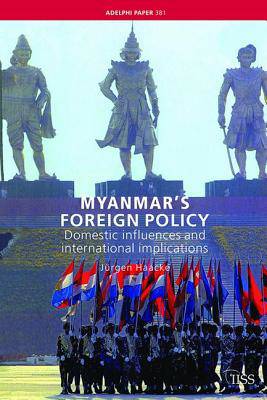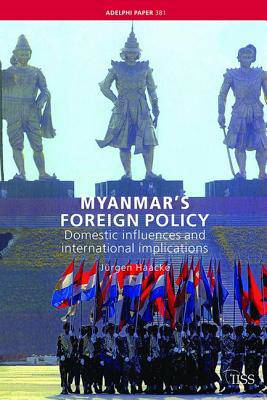
Door een staking bij bpost kan je online bestelling op dit moment iets langer onderweg zijn dan voorzien. Dringend iets nodig? Onze winkels ontvangen jou met open armen!
- Afhalen na 1 uur in een winkel met voorraad
- Gratis thuislevering in België vanaf € 30
- Ruim aanbod met 7 miljoen producten
Door een staking bij bpost kan je online bestelling op dit moment iets langer onderweg zijn dan voorzien. Dringend iets nodig? Onze winkels ontvangen jou met open armen!
- Afhalen na 1 uur in een winkel met voorraad
- Gratis thuislevering in België vanaf € 30
- Ruim aanbod met 7 miljoen producten
Zoeken
€ 351,45
+ 702 punten
Omschrijving
Against the background of its problematic human-rights record and the military regime's continued extra-constitutional rule, Myanmar has faced mounting diplomatic pressure from the international community since the renewed detention of Daw Aung San Suu Kyi in May 2003. This Adelphi Paper examines Myanmar's foreign policy, which is predicated on state-building and development, as well as defending the regime's decision to give priority to establishing an enduring constitution over immediate national reconciliation and democratisation. It discusses how the regime has been able to take advantage of the economic, security and geostrategic interests of both China and India in the country to achieve developmental and security goals, and how its relations with Beijing in particular have assumed ever greater significance as Western capitals have sought to place Myanmar under the scrutiny of the UN Security Council on the grounds that its domestic circumstances have regional security implications. It discusses the regime's objectives, concerns and challenges in its relations with the US, Japan and Europe; details the difficult decisions of the leadership as ASEAN has started to relax its application of the non-interference norm when dealing with Myanmar; and examines its interaction with the UN, particularly the secretary-general and his special envoys. The paper concludes by analysing the likely regional and international implications of intensified political pressure on the military regime.
Specificaties
Betrokkenen
- Auteur(s):
- Uitgeverij:
Inhoud
- Aantal bladzijden:
- 128
- Taal:
- Engels
- Reeks:
Eigenschappen
- Productcode (EAN):
- 9781138405868
- Verschijningsdatum:
- 28/06/2017
- Uitvoering:
- Hardcover
- Formaat:
- Genaaid
- Afmetingen:
- 156 mm x 234 mm
- Gewicht:
- 362 g

Alleen bij Standaard Boekhandel
+ 702 punten op je klantenkaart van Standaard Boekhandel
Beoordelingen
We publiceren alleen reviews die voldoen aan de voorwaarden voor reviews. Bekijk onze voorwaarden voor reviews.











